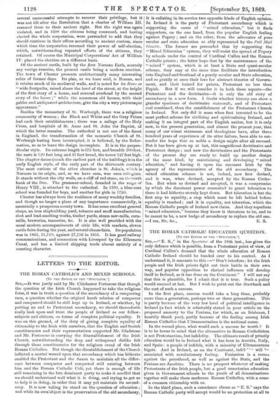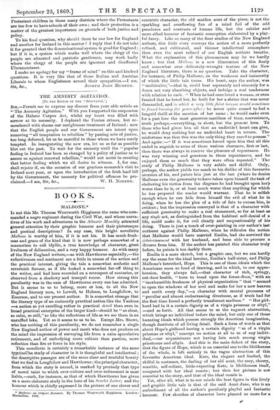THE ROMAN CATHOLIC EDUCATION QUESTION.
[TO THE EDITOR OF THE "SPECTATOR."] SIR,—" E. S.," in the Spectator of the 18th inst., has given the only defence which is possible, from a Protestant point of view, of Cardinal Cullen's demand that the whole education of Roman Catholic Ireland should be handed over to his control. As I understand it, it amounts to this :—" Don't interfere; let the Irish people and the Irish priests fight out their battle in their own way, and popular opposition to clerical influence will develop itself in Ireland, as it has done on the Continent." I will not say that this is plausible, for I admit that it is true. Such a policy would succeed at last. But I wish to point out the drawback and the cost of such a success.
In the first place, success would take a long time, probably more than a generation, perhaps two or three generations. This is partly because of the very low level of political intelligence in Ireland (a fact which is admirably stated in your article on the proposed amnesty to the Fenians, for which, as an Irishman, I heartily thank you), partly because of the feeling among Irish Roman Catholics that Ultramontanism is the national cause.
In the second place, what would such a success be worth ? It is to be borne in mind that the alternative to Roman Catholicism is not Protestantism, but infidelity. The ultimate result of priestly education would be in Ireland what it has been in Austria, Italy, and Spain : a people of infidels, with a minority of Ultramontane bigots. And in Ireland, as on the Continent, infear'''-, will 1,P associated with revolutionary feeling. Fenianism is a revolt against the priesthood, as well as against the State, and the Fenians are Jacobins. There is no prospect whatever of making Protestants of the Irish people, but a good unsectarian education given in Government schools to the youth of all denominations together will make them moderate Roman Catholics, with a sense of a common citizenship with us.
In the third place, such a conscience clause as "E. S." says the Roman Catholic party will accept would be no protection at all to Protestant children in those many districts where the Protestants are too few to have schools of their own ; and their protection is a matter of the greatest importance on grounds of both justice and policy. To his final question, why should there be one law for England and another for Ireland in this matter ? I reply that I do not take it for granted that the denominational system is good for England ; but if it is, a system which works well where the clergy of the people are educated and patriotic gentlemen, may work badly where the clergy of the people are ignorant and disaffected Ultramontanes.
I make no apology for my "frame of mind" on this and kindred questions. It is very like that of those Italian and Austrian Liberals to whom Englishmen accord their sympathies.—I am,































 Previous page
Previous page